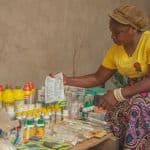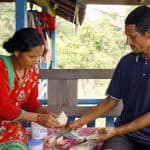Cashing In on Sustainability: A Blended Finance Program Aims to Fight Climate Change by Catalyzing SME Investment in the Peruvian Amazon
In 2020, over 190,000 hectares of primary rainforest in the Peruvian Amazon were lost due to illicit mono-cropping, illegal mining, mass deforestation, cattle ranching and unsustainable agriculture. According to Peru’s Ministry of Environment’s National Forest Conservation Program for Climate Change Mitigation, Peru (and the world) have lost an average of roughly 100,000 hectares of forest per year since 2006. These losses have only accelerated. In 2020, the amount of hectares of forest lost was 37% higher than the prior year, making it the highest loss ever measured.
Due to these changes, the Amazon – long touted as the lungs of the planet for its role in sequestering carbon – is increasingly shifting from a carbon sink to a carbon source. Now more than ever, the Amazon needs a plan of action to ensure its – and our planet’s – preservation. But the economy in Peru’s Amazon region is often dominated by businesses operating illegally – extracting natural resources at the expense of the region and the country. If such practices continue and climate change reaches a tipping point, some scientists predict that large ecosystems like the Amazon rainforest could collapse in the next 50 years.
While Peru has instituted policies that promote environmentally sustainable businesses and green technology, funding gaps persist in this region. And without access to adequate, timely financing, the licit, sustainable small and medium-sized enterprises (SMEs) that could take the place of illegal, extractive businesses are often left out of market growth.
Does the Amazon rainforest really have to perish for businesses to prosper? Many development experts and financiers are saying no. In fact, they are banking on it. But to further job creation, sustainable licit market development and inclusive growth while protecting the Amazon, innovative new approaches will be needed. Below, we’ll discuss how the United States Agency for International Development (USAID) CATALYZE project is partnering with the private sector, local and international financial service providers, and investors to mobilize capital for SMEs in this vital region.
Mobilizing $2 Billion in Capital for Development Impact
USAID CATALYZE, implemented by Palladium, is an eight-year program designed to mobilize $2 billion in private capital for development impact, especially in underserved social sectors and frontier markets across the globe. The program supports blended finance solutions, complemented by a cross-cutting focus on gender-lens investing. Working with local and international businesses and investors, CATALYZE explores commercially-viable opportunities and approaches to creating jobs, developing sustainable social services, tightening and rationalizing supply chains, advancing inclusive growth, and protecting natural resources – including the Amazon. We work across 26 countries in Asia, Africa, Europe, Latin America and the Caribbean, collaborating with 190 partners, including financial institutions, business advisory service providers, anchor firms and job trainers.
Through our CATALYZE Peru project, USAID is using a blended finance approach to incentivize new investments from the private sector in the Peruvian Amazonia region. We do this by:
- Structuring and facilitating private investors’ funding for large-scale projects and business models
- Boosting access to and utilization of finance among SMEs and producer associations
- Supporting the development of digital information systems to increase supply chain transparency, value chain competitiveness and access to finance in the region
In addition to incentivizing investments in private companies – from large corporations to smaller enterprises, such as agricultural producers and waste management companies – CATALYZE Peru is also providing technical assistance to help SMEs expand their ability to sustainably source products and structure financing for their supply chains in the Amazon.
Supporting Local SMEs in the Peruvian Amazon
For example, CATALYZE Peru is supporting Incacaope, a recently founded, medium-sized company in the Peruvian Amazon that produces chocolate and other cocoa products. Working with more than 1,000 cocoa producers and 10 cooperatives, Incacaope is committed to sustainable growth as it expands – and it is currently seeking financing to industrialize its production of cocoa beans by installing a processing plant. To support this effort, CATALYZE Peru is providing the company with business advisory services to help them structure a more favorable loan. The technical assistance USAID provides through these services will help the SME ultimately obtain the US $2 million in private sector financing that will be required for the construction of this facility.
CATALYZE Peru directly supports companies that focus on environmental sustainability and inclusive growth, such as Incacaope. But it has also partnered with seven local and three international financial institutions, providing advisory services that include training, risk mitigation tools, new product design and other incentives. This support will enable these institutions to expand new structured financing and investments in other local businesses, benefitting Amazon geographies, economic sectors and populations both profitably and sustainably.
Protecting the Amazon requires a joint effort to generate an influx of resources to support those who call it home. CATALYZE Peru is on track to mobilize more than US $100 million in sustainable investment deals across the region. More importantly, it is laying the groundwork for other actors to see the importance and viability of such blended financing models so they may be replicated and expanded. As the CATALYZE model continues to be refined and produces increasing results, it will attract continued investment in the region, spurring economic growth, increased employment and higher incomes. But most importantly, it will provide hope – not only for the Amazon, but for a warming world whose future may depend on it.
To learn more about how to work with us, contact: catalyze.comms@thepalladiumgroup.com and visit http://catalyze-procurement.com/.
Luis Garate is a Director of Innovative Finance at USAID CATALYZE Peru, and Rocio Perez Torres is a Communication Specialist for development at Palladium.
Photo courtesy of USAID CATALYZE Peru.
- Categories
- Environment, Investing



